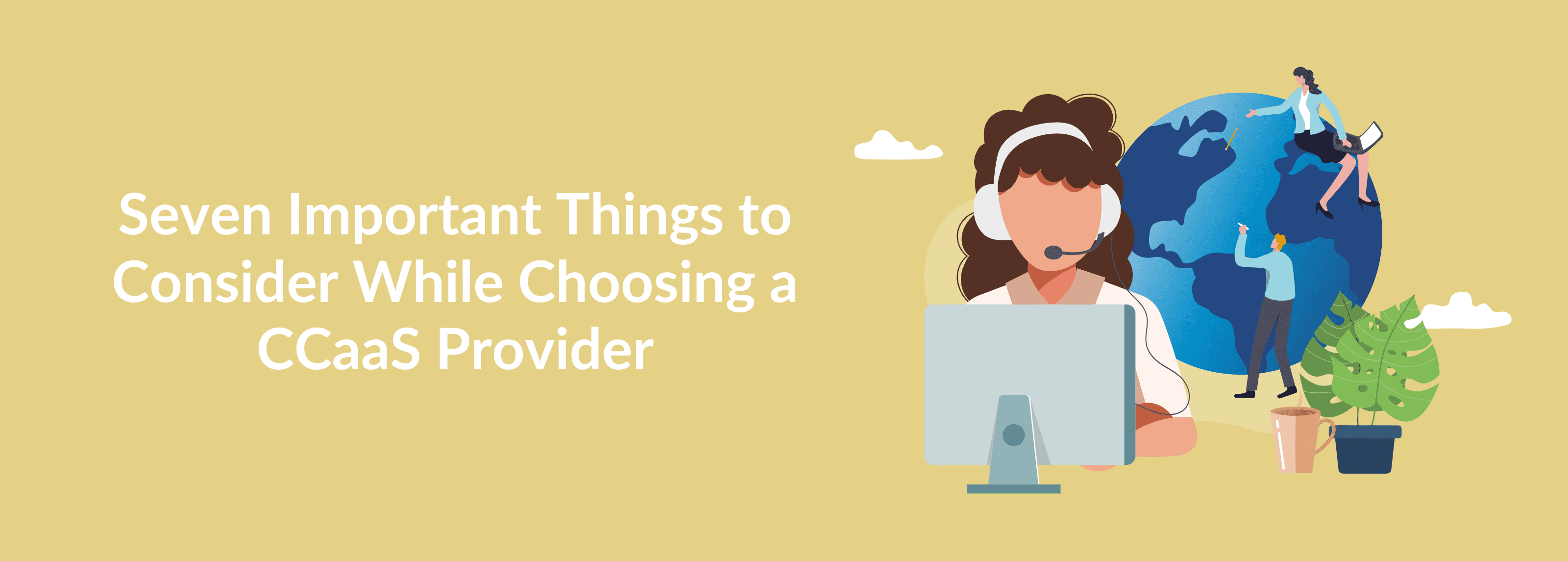Seven Important Things to Consider When Opting for a Contact Center as a Service (CCaaS) Platform
In the last few years, organizations have started looking at customer experience (CX) differently.
Three main factors fuel the fresh perspectives:
- Organizations wanted the comfort of hybrid and remote working for their customer experience folks. This prompted them to adopt cloud offerings.
- Customer expectations have changed with the proliferation of social and AI-based tools.
- Multiple new entrants in the market that boast of Contact Center as a Service (CCaaS) offerings.
These are great times in the customer experience space. Most organizations have started looking at it as a competitive differentiator, and they don’t want to leave anything to chance when it comes to providing exceptional experiences.
While the intent is good, most CCaaS platform haven’t really thought through the scaling and implementation issues with contact centers. You have to ensure customization in a highly regulated environment, develop regional partnerships, and establish global carrier relationships.
All of these are important, and they take time.
Let us look at some of the things that you should be wary of. You should check with your CCaaS solution providers to see whether they meet these needs.
1. Do They Have Global Carrier Relationships?
When your CCaaS platform does not have global carrier relationships, then you will be forced to work with local providers.
This would invariably affect the quality of service (QoS) and, in turn, your customer relationship. You should ensure that your CCaaS platform offers managed services that include voice as a part of their service, as well as SLAs.
2. Who Does the Customization?
This is a massive issue in contact center implementation, especially in regulated industries and countries.
Customizations typically come at a high cost, and it takes up a lot of time. So, in effect, you won’t be up and running within hours of subscribing to your contact center platform.
Ensure that customization is part of your CCaaS offering, and also ensure that the platform provides you with configuration options to do most things needed for their vertical and the markets.
3. Do They Have Referenceable Customers?
What is the best way to validate the credibility of the CCaaS platform and their ability to address your CX needs?
It is by talking to their existing customers and customers in the same geography and a similar domain as yours. This will allow you to understand how well your provider can address your needs.
You can ask specific questions to ensure that you are signing up with the right provider.
4. How Do the Licensing and Contracting Work?
Do you have to provide any minimum commitments to the provider on the number of licenses you subscribe to?
Are there any minimum guarantees?
Are they willing to relook at the contract and commitment at regular intervals?
It would be in your best interest to look at a service provider who comes with no contracts and minimum commitment. With this, you only pay for what you use.
Ideally, ask your provider if they are willing to charge you by the minute. This would allow you to scale up and down your resources per your business needs.
5. How About Integrations?
Does your provider offer pre-built integrations with industry-leading CRM and helpdesk software? Look for a provider who has these integrations.
Besides, how do they integrate with your best-of-breed IT systems? Check if they offer API integrations.
With integrations, your omnichannel journey would be enhanced by your CCaaS platform.
While evaluating integration capabilities is vital, many organizations now look beyond just CCaaS to full communication platforms , see how CPaaS offers embedded APIs for messaging, voice, and video
6. How About the Platform’s Compliance and Security?
Compliance is the real dark spot for contact center providers. Being compliant ensures that you get to work with customers across different verticals worldwide.
Check with your CCaaS provider if they are compliant with the following standards and regulations:
HIPAA, GDPR, TCPA, CCPA, PCI-DSS, FDCPA, Reg-F, SOC2, FedRamp, DoT & TRAI regulations, and ISAE 3402 Type II specifications.
With these compliances in place, you, as a BPO, can work with customers across verticals and geographies without any issues. Even if you are a contact center or an enterprise working in a particular domain, these compliances would help.
Security can be a real deal when choosing your provider. A few things to look at include:
Check if your CCaaS platform has full-time staff monitoring their security operations center round-the-clock against attacks and vulnerabilities. Do they have access to the global vulnerability database?
Does your provider offer redundancy, failover routes, virtualization, and physical security of your servers?
7. How Do You Pick and Choose?
Let us assume that your CCaaS platform has a bouquet of offerings – dialer, voice, intelligent routing, IVR, voice broadcasting, workforce management, workforce engagement, list management services, analytics, reporting, chatbots, voice bots, conversational AI integrations, NLP capabilities, and NLC compliance among others.
Do they let you pick and choose what you want? Do they have a per-minute pricing based on what you choose?
That would be a win-win for both, and it would make your life easier and simpler.
As a buyer who is subscribing to a CCaaS provider, you should look at all these possibilities. This would allow you to shortlist your providers and make an informed choice on your contact center platform.
After all, the contact center platform is going to be the heart of your customer experience function, which allows you to differentiate in the marketplace competitively.
